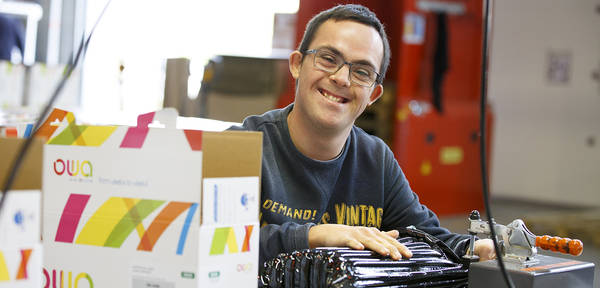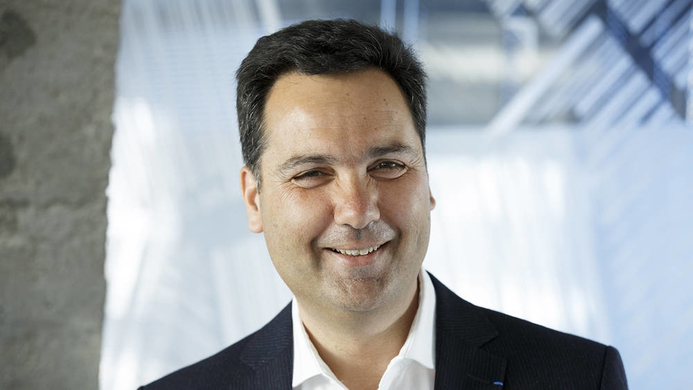Innovating is the mantra of many intermediate-sized firms: for Armor, industrial innovation is "in its genes"...
Armor started making carbon paper in 1922. It then started producing ribbons for typewriters, fax paper rolls, ink and toner cartridges, followed by thermal transfer ribbons for printing barcodes, our main business line today. The company has steadily developed innovative solutions based on its expertise in ink and thin-layer coating on thin films. In 2010, Armor used this expertise once again, this time to make a commitment to renewable energy. First, by making flexible organic photovoltaic film, free of rare metals, followed by aluminum current collector film coated with a protective solution to improve electric battery performance.
Would you say your aim is to build a profitable business model that addresses social issues?
Yes, absolutely. Armor strives to be a high-tech industrial company that responds to the challenges facing society today. For example, through thermal transfer printing for packaging and bar-coded labels, we ensure safety for assets and for people - numerous food industry crises have demonstrated the crucial importance of traceability. Additionally, through OWA, Armor has initiated the first method for 100% recycled printing in keeping with a circular economy whereby companies combine responsible printing with environmental preservation.
Similarly, the production of coated collectors for electric batteries addresses an environmental issue at a time when electric mobility is rapidly increasing. Finally, the new generation of photovoltaic films will make solar energy available to a greater number of people. Armor aims to address issues facing society today through technological innovations: these ambitions come together in our profitable business model.
Early in your career you founded Contigo ("With You"), an organization for microcredit in Chili: is this where your social-minded approach to business comes from?
A friend of mine, Laurent Marbacher (H.86), and I created a bank for microcredit in the spirit of Muhammad Yunus's Grameen Bank, which was little-known at the time. It was an unforgettable experience and we developed the project in cooperation with people from the deprived neighborhoods of Santiago de Chili, in order to create businesses starting out with nothing. This responded to a social problem: how to provide access to bank credit to the more than 400,000 Chilean micro businesses excluded from it.
We were among the pioneers of microcredit in Latin America: these loans led to the creation of some 50,000 companies and the creation of over 100,000 jobs. When the project was handed over to Chilean teams seven years later, five Chilean banks started following in our footsteps, providing fresh impetus for the country's economy.
What did you find appealing about Armor?
I was 29 when I came back to France and joined Rhône-Poulenc in order to do something completely different, try a career in the field of industrial marketing, which led me to work in Asia. All in all, it was a fascinating experience in global management, but I missed the agility, independence and intensity of taking full responsibility for all aspects of a firm. That's what I liked about Armor: it's an intermediate-sized enterprise with international scope that develops innovative solutions for highly-specialized industrial needs. I wanted the freedom to develop a long-term project, helping teams grow around me and establishing a style of management based on trust, with a precise capitalistic and industrial strategy, which would bear fruit in time. On a smaller scale, Armor is like a little Michelin in Nantes: this link between a business and its region reveals another side of the economy.
Is your trust-based management style an example of the social innovation you call for, much like “shared labor-relations dialogue?"
Yes, in my opinion a management style based on trust is the key to uniting teams, creating excitement, freeing up energy and increasing the corporate spirit. Armor's success is not based on me. It is instead based on everyone who works here: each employee can contribute to progress, provided that positive initiatives are recognized. In Chile I was astounded by the micro-entrepreneurs' potential for initiative.
A management style based on trust is the key to uniting teams.
They were usually very poor people, but they demonstrated exceptional ingenuity for creating businesses in all fields! As for "shared labor-relations dialogue", I believe it is important in the same way: everything relies on this dialogue, which includes a relationship based on trust with the partners who love their company...if we respect and listen to each other, if we talk about what is best for the company and the individuals who comprise it, there are many areas in which we can build extraordinary things together. This dialogue has enabled us to sign many agreements extending beyond the requirements of the law, whether for training young people, seniors, etc.
What exactly does your co-industrialization strategy consist of and what are the prospects between now and 2020?
Armor has grown steadily over the past ten years to become the top global player in the thermal transfer field today. We manufacture nearly all our semi-finished products (jumbo inked reels) in Nantes. The reels are then cut into tailor-made ribbons for industrial printing in facilities located as close to our customers as possible. Specifically, this means that Armor has an industrial cutting plant in Nantes as an extension of its production chain for all of Europe, as well as nearly ten slitting plants located on all the continents.
A strategy for keeping jobs in France: relying on a very competitive plant in France (based on the automation of its processes without reducing the workforce) to serve rapidly expanding markets throughout the world, and thus fuel growth in France. This model has already generated a yearly growth of 8% per year, and should allow us to exceed a turnover of €300 million in 2020.
So this model, which represents the opposite of offshoring, respects humanist values?
It all comes down to the quality of individual relationships. Taking time to listen to an employee talk about his projects, concerns or aspirations gives him the neces-sary ingredients to persevere with renewed energy. Similarly, our approach to wel-coming disabled people is based on our belief that there is a place for fragility at Armor.
The presence of a disabled person does not jeopardize the development of the company, it creates a space for living together - by daring to ask for help, the spiral of competition between individuals is broken.
Contrary to popular belief, the presence of a disabled person does not jeopardize the development of the company, it creates a space for living together - by daring to ask for help, the spiral of competition between individuals is broken. When you have a fragile person in your team, unless you are completely inhuman, it provides an opportunity for discovering the other and taking initiative. This ultimately creates more efficient teams.

You and your management team took control of the company through a CMII (industrial and innovation capital management corporation) operation: was this the appropriate response for Armor's development?
Until 2008, Armor was a family-owned intermediate-sized enterprise, and it was then sold to an investment fund that wanted to dispose of its stake in 2013. Armor ran the risk of being sold to other investors with a short-term financial outlook, or sold to a competitor who would have broken up the company... So my management team and I decided to propose a takeover plan, not through a traditional LBO but according to specific terms and conditions for building entrepreneurial and social capitalism.
We reinvested the totality of our previous investment in this new transaction, thus going into debt again, and we chose to associate all interested employees in this capital transaction, regardless of category of personnel. We strive to build a long-term industrial and innovation project: a large portion of profits have been invested in R&D in order to develop new activities, such as solar energy or films for electric batteries. This requires long-term capital stability.








